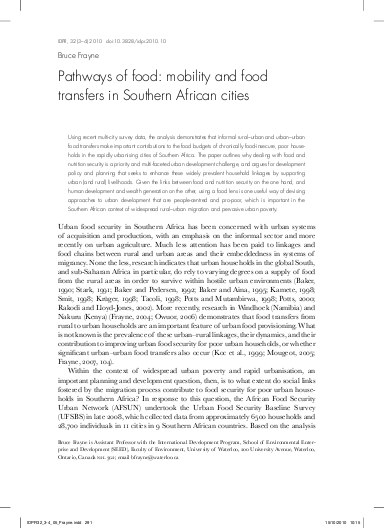
Within the context of widespread urban poverty and rapid urbanisation, an important planning and development question, then, is to what extent do social links fostered by the migration process contribute to food security for poor urban households in Southern Africa? In response to this question, the African Food Security Urban Network (AFSUN) undertook the Urban Food Security Baseline Survey (UFSBS) in late 2008, which collected data from approximately 6500 households and 28,700 individuals in 11 cities in 9 Southern African countries. Based on the analysis of the survey data, this article argues that urban–rural connections – fostered by the social capital provided by the migration and urbanisation process in Southern Africa – are an important dimension of household livelihoods in urban areas, and do play a significant role in ameliorating the generally high levels of chronic food insecurity experienced by poor, urban households (Frayne et al., 2010). Furthermore, the data show that urban–urban links between households in different cities are becoming an equally important system of urban food provisioning.
Resource collections
- UN Habitat - Urban Response Collection
- Urban Response - Urban Crisis Preparedness and Risk Reduction
- Urban Response Collection - Community Engagement and Social Cohesion
- Urban Response Collection - Economic Recovery
- Urban Response Collection - Environment and Climate Change
- Urban Response Collection - Housing, Land and Property
- Urban Response Collection - Urban Crisis Response, Recovery and Reconstruction
- Urban Response Collection - Urban Resilience